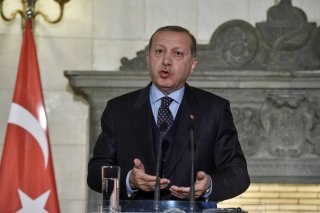Only America Can Resolve the Cyprus Question
Without a viable solution to the Cyprus dispute, Western security will remain in a perpetual state of fragility.
This brings us to the question of why Washington should broker a negotiated settlement in Cyprus and how it could actually succeed. Put simply, the United States is the only actor with enough diplomatic clout to be considered credible by all sides in the dispute. The Obama administration missed an opportunity to take on this issue, mainly because it considered it relatively unimportant. This mistake should not be repeated. This is a festering issue that carries with it the potential to embroil the whole of the Western hemisphere in a catastrophic military conflict that would destabilize NATO’s eastern flank. But through a settlement, NATO and European security could be enhanced by resolving the Turkish and Cypriot objections that prevent defense integration.
Unfortunately, the EU is not a credible entity in the eyes of Turkey, as Cyprus and Greece are already members. This is a non-starter. The UN is often thought to be the next logical choice. After all, it was the main force behind the 2004 negotiations. However, in this climate, the UN does not have the ability to arm-twist and offer incentives like the United States. A special envoy tasked by the White House to oversee negotiations is the only viable option to resolve the Cyprus quagmire.
The United States has several cards up its sleeve that could prove decisive in moving the needle toward an equitable solution. First, Washington is a relative novice with the issue and is looked upon less suspiciously by all parties. Second, the United States has a proven ability to get conflicting sides to the table. For instance, Washington brought together Yasser Arafat and Yitzhak Rabin, Sinn Fein and the British government, and Israel and the signatories to the Abraham Accords.
As far as convincing Turkey to come to the table and abandon its insistence on a two-state solution, Washington could entice Ankara with conditional commitments on F-16 sales, provided that Turkey moves decisively to divest itself of its S-400 inventories (and generally become a more amicable member of NATO). Of greater interest to Ankara would be for the United States to pitch a free trade agreement. This would be an important gain, as it would provide an economic dimension to anchor the U.S.-Turkish strategic partnership, which has always been missing since the beginning of the Cold War. With increased economic ties, Turkey and America’s likelihood of falling out with one another would be reduced.
Arm-twisting the Greek Cypriots may be a little harder. That being said, they are interested in acquiring U.S.-manufactured weapons systems, which could be made contingent on their willingness to negotiate in good faith. America could also convince the United Kingdom to transform its sovereign bases on the island into NATO bases—something the Greek Cypriots would very much welcome. Obviously, these are initial suggestions that only demonstrate the bargaining power that the United States may possess. Reaching a negotiated settlement is likely to be challenging due to long-standing issues such as the status of Turkish troops on the island, property/land disputes, and the future of settled Turks on the island.
It’s understandable that Washington is focused on the war in Ukraine and the pacing threat of China. However, a price is attached to being the leader of the liberal international order. Nature abhors a vacuum, and the absence of American leadership in major theaters is being preyed upon by China and Russia. Cyprus is one such theater. Peacefully resolving this intractable problem will yield much more than merely mending relations between Turkey, Greece, and Cyprus. It will be a fundamental component of efforts to limit Russian influence over allies such as Turkey, secure energy sources independent of Moscow, and integrate the European and transatlantic security framework.
This is easier said than done. Prioritizing Cyprus will require vision and leadership. Sadly, this is largely absent in Washington—a problem not confined to the United States. The Western hemisphere is bereft of effective leaders. Reuniting Cyprus through a negotiated settlement—and reaping the array of rewards it would bring—will require not just a vision but a fundamental rethinking. Western leaders must focus on the costs of not taking action rather than the costs of taking action. This approach helped create a robust and attractive world order after World War II. Without such leadership and strategic foresight, turbulence and decay in the Eastern Mediterranean may lead to armed conflict.
Sinan Ciddi is a non-resident senior fellow at the Foundation for Defense of Democracies (FDD), where he contributes to FDD’s Turkey Program and Center on Military and Political Power (CMPP). He is also an Associate Professor of Security Studies at the Command and Staff College-Marine Corps University and Georgetown University’s School of Foreign Service.
Image: Ververidis Vasilis/Shutterstock.com

